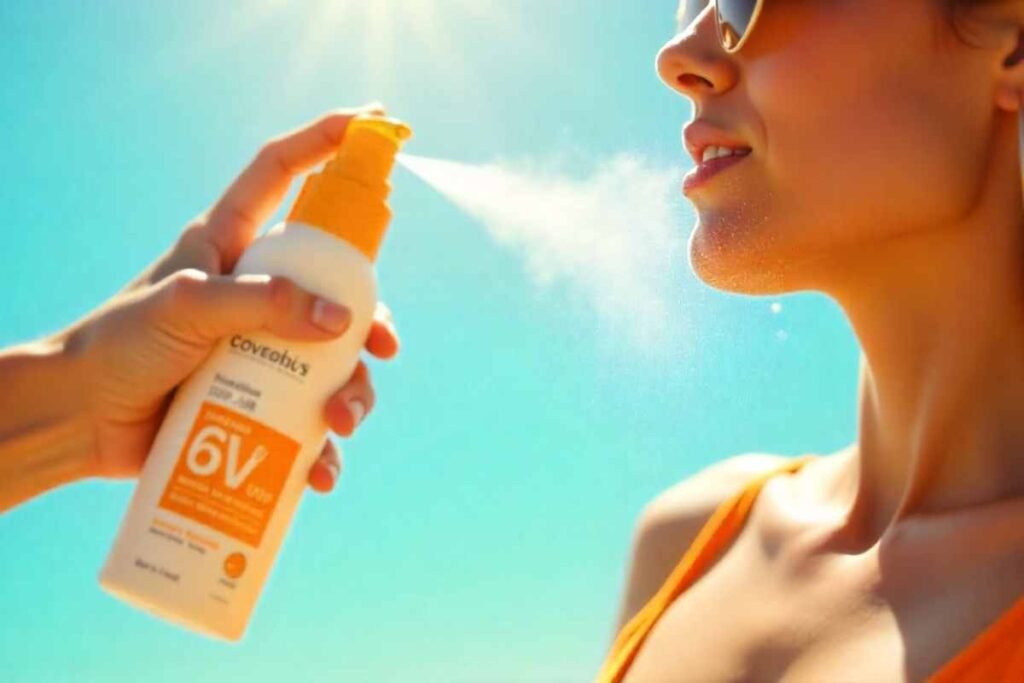Sunscreen spray has become one of the most convenient and effective ways to protect the skin from harmful UV rays. With rising awareness about skin cancer premature aging and sunburn people now prioritize easy to apply sun protection. Unlike traditional lotions sunscreenoffers a lightweight texture quick absorption and the advantage of reaching areas that are often missed.
In this detailed guide you will learn what spray is why it is essential how to use it correctly and the best practices for maximum protection.
What is Sunscreen Spray?

Sunscreen spray is a sun protection product formulated in a mist or spray form. It works by either absorbing or reflecting harmful UV radiation before it penetrates the skin. Most sprays provide broad spectrum protection meaning they block both UVA and UVB rays. The lightweight formula makes them suitable for daily use and reapplication, even over makeup or during outdoor activities.
Why Sunscreen Spray is Important?
The importance of sunscreen lies in its convenience and effectiveness. It reduces the risk of sunburn, skin cancer, and early aging signs such as wrinkles and pigmentation. Since people often avoid sunscreen due to its sticky texture, the spray form provides an easier and faster alternative. By protecting skin cells from UV damage sunscreen helps maintain a healthy and youthful appearance.
How Sunscreen Spray Works?
Sunscreen spray works by forming a protective layer on the skin’s surface. The active ingredients, such as zinc oxide, titanium dioxide, avobenzone or oxybenzone either reflect or absorb UV rays. Once applied the formula bonds with the skin reducing the penetration of radiation that causes DNA damage. The spray delivery system ensures even coverage especially when applied from multiple angles.
Step by Step Guide to Using Sunscreen Spray?
- Shake the bottle thoroughly.
- Hold six inches away from the skin.
- Apply evenly across exposed areas.
- Rub into the skin to ensure absorption.
- Reapply every two hours or after swimming.
How Long Does Sunscreen Spray Last on Skin?
On average sunscreen lasts about two hours on the skin. Factors like sweating swimming and towel drying can reduce its effectiveness. Reapplication is essential for consistent protection. Even water-resistant sprays eventually wear off and must be reapplied after water exposure.
Benefits of Sunscreen Spray
Using sunscreen offers several benefits. It provides broad-spectrum UV protection, preventing sunburn and reducing the risk of skin cancer. Its lightweight texture ensures comfort without greasy residue. The spray format allows quick application on hard-to-reach areas like the back and shoulders. Many sunscreen are also water-resistant, making them suitable for beach outings, sports, or swimming.
How to Apply Sunscreen Spray Correctly?

Applying sunscreen spray requires technique for full effectiveness. Shake the bottle well before use to ensure even distribution of ingredients. Hold the spray about six inches from the skin and apply generously. Rub the product gently into the skin to avoid missing spots. Always reapply every two hours or after swimming, sweating or towel drying. For the face, it’s best to spray into your hands first and then pat onto the skin to prevent inhalation.
Choosing the Right Sunscreen
When selecting spray look for broad-spectrum protection with at least SPF 30. Consider your skin type opt for oil free versions if you have oily skin, or moisturizing ones if your skin is dry. Fragrance- free options suit sensitive skin, while mineral sprays may be better for children. Always check for water resistance if you plan to swim or exercise outdoors.
Common Myths About Sunscreen Spray
Many myths surround sunscreen. Some believe that SPF in makeup eliminates the need for sunscreen but sprays still provide better coverage. Another misconception is that darker skin tones don’t require sun protection in reality everyone is susceptible to UV damage. People also assume one spray is enough for the entire day, but reapplication is always necessary.
Best Time to Apply Sunscreen Spray
The best time to apply sunscreen is 15 to 30 minutes before sun exposure. This allows the product-reviews-by-technorozen/ to bind effectively to the skin. Reapplication is equally important every two hours or immediately after sweating or swimming. Using sunscreen even on cloudy days is recommended since UV rays can penetrate through clouds and windows.
Sunscreen Spray for Different Skin Types
Not all sprays suit every skin type. For oily or acne-prone skin non comedogenic sprays prevent clogged pores. Sensitive skin requires hypoallergenic fragrance free options. Dry skin may benefit from hydrating sprays with added moisturizers. Childrens skin needs mineral-based formulas while athletes should choose sweat and water-resistant products.
Sunscreen Spray and Makeup
Many people wonder if sunscreen spray can be used with makeup. The answer is yes. Sprays can be applied over makeup without smudging making them ideal for reapplication during the day. Some sprays even contain mattifying agents to reduce shine. Always ensure the spray is evenly distributed for consistent protection.
Sunscreen for Outdoor Activities
Outdoor activities like running swimming hiking or cycling expose the skin to prolonged sun exposure. Sunscreen spray is perfect in such cases due to its lightweight non greasy nature and quick application. Its portability makes it easy to carry and reapply whenever needed. Athletes often prefer sprays because they don’t interfere with performance.
Potential Side Effects of Sunscreen Spray
While generally safe spray can have side effects if misused. Spraying directly onto the face may cause eye irritation or inhalation risks. Some chemical sunscreens may trigger allergic reactions in sensitive individuals. Always perform a patch test before full use, and choose fragrance free dermatologist-tested formulas if you have sensitive skin.
Eco Friendly Sunscreen Sprays
Concerns about coral reef damage from certain sunscreen ingredients have led to eco-friendly alternatives. Reef safe sprays use mineral-based ingredients like zinc oxide and titanium dioxide instead of harmful chemicals like oxybenzone. These formulas protect both your skin and the environment making them a responsible choice for beach vacations.
Can You Use Sunscreen Spray Every Day

Yes sunscreen can and should be used daily. UV exposure occurs year-round regardless of season or weather. Daily use reduces the risk of long-term damage such as hyperpigmentation and skin cancer. Lightweight sprays make everyday application convenient and non-intrusive.
Conclusion
Sunscreen spray has revolutionized sun protection with its convenience lightweight texture and effective coverage. By choosing the right formula applying it properly and reapplying consistently you can protect your skin from harmful UV damage. Whether for daily use outdoor activities or layering over makeup spray offers versatile and reliable protection.
FAQs
What is the difference between sunscreen spray and lotion?
Sunscreen spray is lightweight and easier to apply while lotion offers more hydration and thicker coverage.
Can I apply spray on my face?
Yes but spray it into your hands first and then apply to avoid inhalation.
How often should I reapply sunscreen spray?
Every two hours and immediately after sweating, swimming or towel drying.
Is sunscreen spray safe for children?
Yes but mineral based sprays with zinc oxide or titanium dioxide are recommended for kids.
Can sunscreen go over makeup?
Yes it can be applied over makeup without smudging making it great for touch-ups.
Does sunscreen spray expire?
Yes check the expiration date using expired sunscreen reduces effectiveness.


